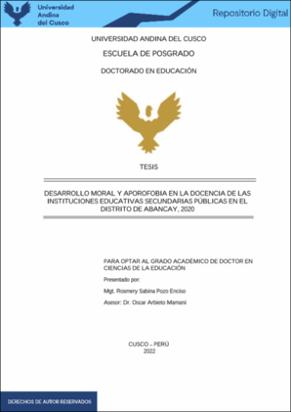| dc.contributor.advisor | Arbieto Mamani, Oscar | |
| dc.contributor.author | Pozo Enciso, Rosmery Sabina | |
| dc.date.accessioned | 2022-12-13T17:30:43Z | |
| dc.date.available | 2022-12-13T17:30:43Z | |
| dc.date.issued | 2022-10-17 | |
| dc.identifier.uri | https://hdl.handle.net/20.500.12557/5021 | |
| dc.description.abstract | El estudio tuvo como fin principal explicar la incidencia del nivel de desarrollo moral en lasmanifestaciones de conductas aporofóbicas en la docencia de las instituciones educativas
secundarias públicas del distrito de Abancay, 2020. La investigación se enfocó desde laperspectiva de la axiología pues se soporta en los valores morales de los docentes y sus
comportamentos en la práctica educativa. Así mismo, se trató de un estudio explicativo deenfoque cuantitativo, de tipo correlacional transeccional. La muestra estuvo conformada por198 docentes de educación secundaria, del distrito de Abancay, seleccionada mediante unmuestreo probabilístico aleatorio simple. El instrumento que se utilizó fue el Test deDefinición de Criterios (Defining Issues Test-DIT), construido a partir de los 10 valoresmorales básicos y de los estadios del razonamiento moral de Kohlberg (1992) que formulaproblemas sociomorales, denominados dilemas. Para análisis estadístico se utilizó el análisisdescriptivo con tablas de frecuencia y el inferencial con la prueba de regresión logísticaordinal. Se llego a la conclusión que el nivel de desarrollo moral incide de forma significativa enel comportamiento aporofóbico, ya que el puntaje Wald de 17,358 que es superior a 4 que viene a
ser el punto de corte para el modelo de análisis y es reforzado por p =0,000 < a 0.05 lo cual lleva aque sea rechazada la hipótesis nula, pudiendo inferirse que el nivel de desarrollo moral incide deforma significativa en el comportamiento aporofóbico en la docencia de las Instituciones Educativassecundarias públicas del distrito de Abancay. Así mismo, se evidenció que los docentesencuestados poseen un desarrollo moral que se corresponde con la clasificación
posconvencional, es decir que poseen principios y valores éticos adecuados a su edad y
congruentes con su profesión, caracterizada por comportamientos inclusivos, respetuosos ysolidarios con la totalidad de sus estudiantes, y ello hace que se distancien de cualquier
comportamiento aporofóbico. | es_PE |
| dc.description.abstract | The main purpose of the study was to explain the incidence of the level of moral development
in the manifestations of aporophobic behaviors in the teaching of public secondary
educational institutions in the district of Abancay, 2020. The research was focused from the
perspective of axiology because it is supported by the moral values of teachers and their
behaviors in educational practice. Likewise, it was an explanatory study of quantitative
approach, of a translational correlational type. The sample was made up of 198 secondary
school teachers from the district of Abancay, selected using a simple random probabilistic
sampling. The instrument used was the Defining Issues Test (DIT), built from the 10 basic
moral values and the stages of moral reasoning of Kohlberg (1992) that formulates
sociomoral problems, called dilemmas. For statistical analysis, descriptive analysis with
frequency tables and inferential analysis with the ordinal logistic regression test were used.
It was concluded that the level of moral development significantly affects the aporophobic
behavior, since the Wald score of 17.358 that is higher than 4 that comes to be the cut-off
point for the analysis model and is reinforced by p = 0.000 < to 0.05 which leads to the null
hypothesis being rejected, and it can be inferred that the level of development Morality has
a significant impact on the aporophobic behavior in the teaching of public secondary
educational institutions in the district of Abancay. Likewise, it was evidenced that the
teachers surveyed have a moral development that corresponds to the post-conventional
classification, that is, they have ethical principles and values appropriate to their age and
congruent with their profession, characterized by inclusive, respectful and supportive
behaviors with all their students, and this makes them distance themselves from any
aporophobic behavior. | en_US |
| dc.format | application/pdf | es_PE |
| dc.language.iso | spa | es_PE |
| dc.publisher | Universidad Andina del Cusco | es_PE |
| dc.rights | info:eu-repo/semantics/openAccess | es_PE |
| dc.rights.uri | https://creativecommons.org/licenses/by-nc-nd/4.0/ | es_PE |
| dc.subject | Docencia | es_PE |
| dc.subject | Pobreza | es_PE |
| dc.subject | Desarrollo moral | es_PE |
| dc.subject | Educación secundaria | es_PE |
| dc.title | Desarrollo moral y aporofobia en la docencia de las instituciones educativas secundarias públicas en el distrito de Abancay, 2020 | es_PE |
| dc.type | info:eu-repo/semantics/doctoralThesis | es_PE |
| thesis.degree.name | Doctora en Ciencias de la Educación | es_PE |
| thesis.degree.grantor | Universidad Andina del Cusco. Escuela de Posgrado | es_PE |
| thesis.degree.discipline | Ciencias de la Educación | es_PE |
| dc.publisher.country | PE | es_PE |
| dc.subject.ocde | https://purl.org/pe-repo/ocde/ford#5.03.00 | es_PE |
| renati.advisor.dni | 31037035 | |
| renati.advisor.orcid | https://orcid.org/0000-0003-1617-1528 | es_PE |
| renati.author.dni | 31039393 | |
| renati.discipline | 199018 | es_PE |
| renati.juror | Aguirre Espinoza, Edwards Jesús | |
| renati.juror | Cuba Esquivel, Amadeo | |
| renati.juror | Suarez Sanchez, Richard | |
| renati.juror | Aco Corrales, Eder Arturo | |
| renati.level | https://purl.org/pe-repo/renati/level#doctor | es_PE |
| renati.type | https://purl.org/pe-repo/renati/type#tesis | es_PE |


